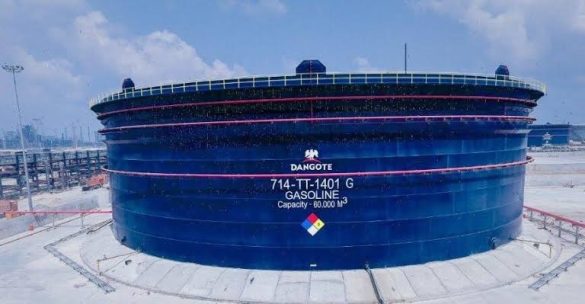KEY POINTS
- Dangote claims his $20 billion Lagos refinery has ended Nigeria’s decades-long fuel queues and slashed petrol prices.
- The plant has exported over 1.1 billion liters of fuel since June, boosting foreign exchange earnings.
- Dangote says the refinery is generating tens of thousands of jobs and urges lawmakers to protect local industries under a “Nigeria First” policy.
Aliko Dangote isn’t known for understatement. But when the billionaire industrialist declared that his 650,000-barrels-a-day refinery had ended Nigeria’s half-century struggle with fuel queues, it was a statement loaded with symbolism.
Speaking at a conference in Lagos to mark the first anniversary of petrol output from the $20 billion plant, Dangote said Nigeria had lived with recurring fuel shortages and serpentine queues since 1975. That era, he insisted, is now behind Africa’s largest oil producer.
“We have been battling fuel queues since 1975, but today Nigerians are witnessing a new era,” he told industry leaders and policymakers.
For decades, Africa’s biggest economy has exported crude only to re-import refined products at a premium, a cycle that cost billions in subsidies and created one of the continent’s most enduring economic paradoxes.
Dangote’s refinery, commissioned in September 2024, was pitched as the solution—though few believed it would actually materialize.
Betting His Fortune on a Refinery
Dangote acknowledged the scale of risk he took. Industry veterans and financiers warned him that such mega-projects were the domain of states, not individuals. If the refinery had collapsed, he said, “lenders would have taken all my assets.”
Instead, the refinery is now feeding Nigeria’s domestic market and pushing excess volumes abroad. Between June and early September 2025 alone, the facility exported more than 1.1 billion liters of petrol, helping the country earn much-needed foreign exchange.
At home, pump prices have already fallen from nearly ₦1,100 a liter before the refinery began operations to about ₦841 across Lagos, Abuja, Rivers, Delta, Edo, and Kwara.
Dangote said the ongoing rollout of compressed natural gas, CNG, trucks will extend that relief nationwide.
Dangote was also quick to stress that the refinery is not displacing workers but generating jobs on a massive scale.
The company has deployed 4,000 CNG-powered trucks, expected to create at least 24,000 direct and indirect jobs across Nigeria. Drivers, he said, earn three times the minimum wage and receive life insurance, pensions, and health coverage for their families.



